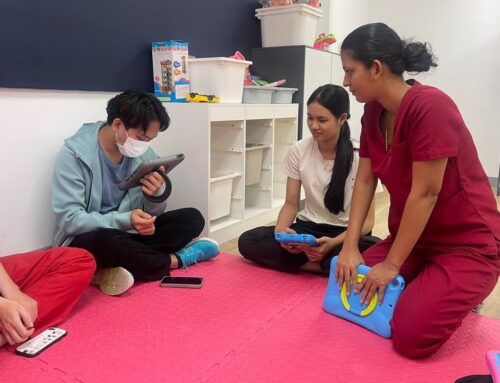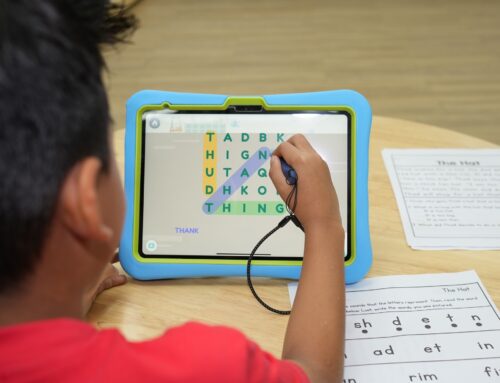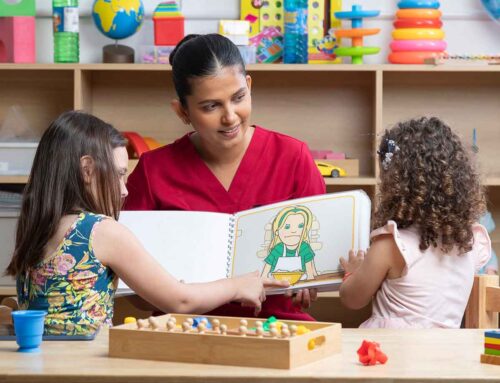Every parent wants their child to have friends — to laugh, play, and feel accepted. Yet, for many children in Cambodia who face communication challenges, forming friendships can be difficult. That’s where speech therapy comes in. Beyond helping children pronounce words clearly, speech therapy supports social skills, emotional understanding, and confidence — the building blocks of strong friendships. At OrbRom Center in Phnom Penh, our therapists work closely with children to strengthen these essential life skills in a supportive and inclusive environment.
The Link Between Communication and Friendship
Friendships are built on communication — the ability to express thoughts, listen to others, and share experiences. Children with speech or language delays often struggle with these skills, making social interactions overwhelming. They may hesitate to join games, misunderstand cues, or withdraw from group activities.
Through speech therapy in Phnom Penh, children learn not only how to speak more clearly but also how to use language for connection. Therapists help children practice turn-taking, active listening, and maintaining eye contact — all crucial parts of meaningful conversation. These lessons naturally extend into the playground, classroom, and family life, helping children connect more confidently with peers.
You can learn more about how early communication skills develop in our guide, What Parents Should Know About Speech Delays and Early Communication Development.
Building Social Confidence Through Practice
Many children with communication challenges lack confidence, fearing they’ll be misunderstood or teased. Speech therapy creates a safe space to practice social interactions through play-based learning. Activities such as role-playing, storytelling, and interactive games allow children to explore different social scenarios in a relaxed, supportive setting.
At OrbRom Center, our Speech Therapy programs focus on improving both verbal and nonverbal communication. Therapists guide children in understanding tone, facial expressions, and body language — skills that make communication natural and enjoyable.
For example, in our group sessions, children practice introducing themselves, asking questions, and sharing ideas — everyday skills that translate directly into forming friendships. Parents often notice that after a few weeks, their child becomes more willing to engage with classmates or siblings at home.
To see how interactive approaches encourage speech and social development, read our post on Group Speech Therapy in Phnom Penh: Boosting Communication Through Social Interaction and Play.
Teaching Emotional Understanding and Empathy
Friendships thrive on empathy — the ability to understand and respond to others’ emotions. Many children with speech or language disorders also struggle to interpret social-emotional cues, which can lead to misunderstandings or frustration.
Speech therapists help children recognize emotions in themselves and others. By labeling emotions, using stories, and practicing role-play, children begin to understand what others might be feeling. This not only helps them communicate better but also encourages kindness, patience, and connection.
Our therapy sessions often include emotion-themed games and storytelling activities designed to help children identify expressions like happiness, sadness, or surprise. Over time, this emotional awareness helps children respond more appropriately in social settings, deepening their relationships with peers.
If you’d like to explore more about this topic, visit Teaching Emotions Through Speech Therapy: Helping Kids Express Themselves.
Collaboration Between Home, School, and Therapy
Speech therapy success doesn’t happen in isolation. For lasting results, parents, teachers, and therapists must work together. At OrbRom Center, we collaborate with schools and families across Phnom Penh to ensure that children can apply communication strategies beyond the therapy room.
Parents receive practical tips for encouraging language and social play at home — from family meal conversations to shared playtime. Teachers are also guided on how to support children during classroom interactions or group activities. This consistent support ensures children feel confident and connected wherever they go.
For families who want a comprehensive approach, our Special Needs Intensive Intervention Program and Preschool Program offer integrated support that combines therapy, play, and social learning for lasting developmental progress.
Real-Life Benefits: From Shy to Sociable
Parents often describe remarkable transformations after consistent speech therapy. A once-quiet child begins greeting classmates, joining games, or sharing stories. These small moments mark big progress — not only in communication but in confidence and belonging.
At OrbRom, we believe every child deserves to be heard and understood. Speech therapy is more than correcting sounds — it’s about giving children the tools to connect, make friends, and thrive in every environment, from Phnom Penh classrooms to playgrounds across Cambodia.
To discover how we can help your child build communication and confidence, explore our Speech Therapy Services in Phnom Penh.
Conclusion
Friendships are essential for a child’s emotional and social growth, and speech therapy provides the foundation to make those connections possible. By improving communication, confidence, and empathy, speech therapy helps children build lasting friendships that enrich their lives.
At OrbRom Center in Phnom Penh, our experienced speech-language pathologists combine evidence-based practices with compassion to help every child reach their full potential. Whether your child struggles with speech, language, or social interaction, we’re here to help them find their voice — and their friends.
We are the only Preschool specialized on children with special needs in PhnomPenh.
- Internationally qualified teachers
- Cambodia’s largest sensory room
- Outdoor swimming pool
- Covered outdoor playground
📞 Phone: 077.455.993
Telegram Link: https://t.me/OrbRom





